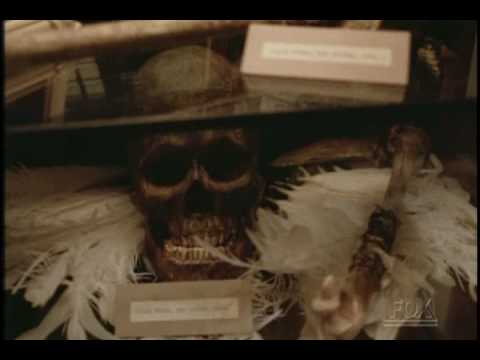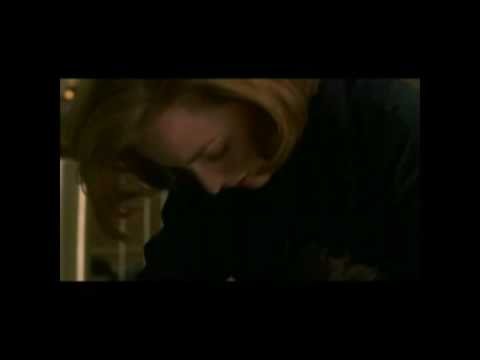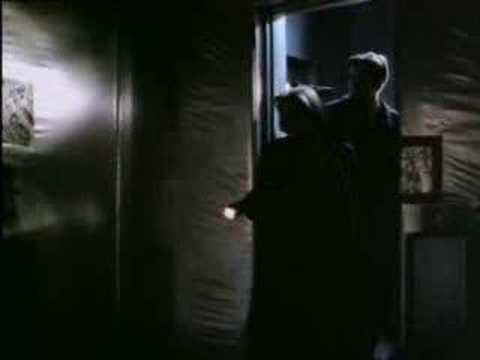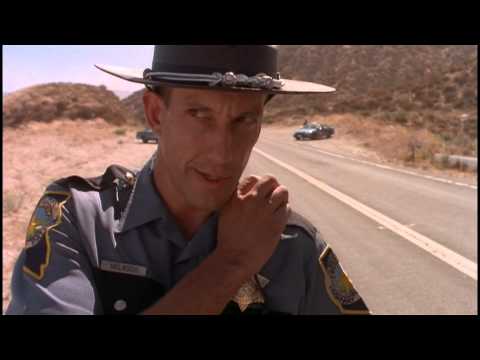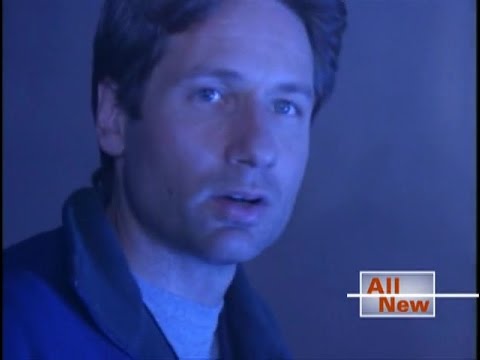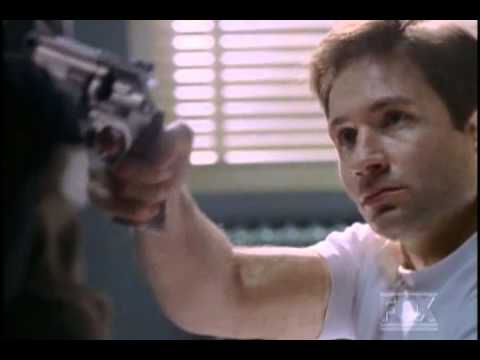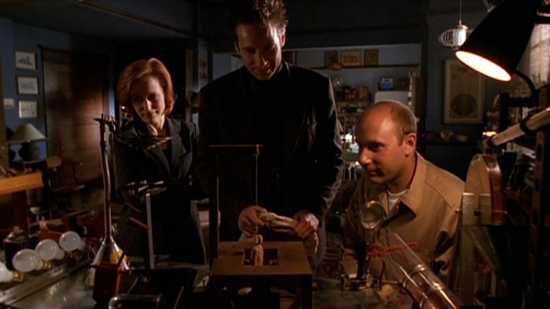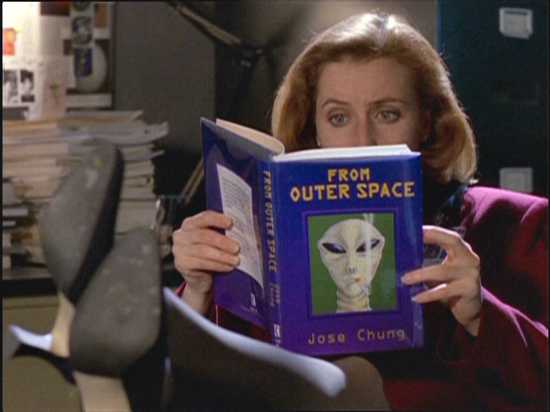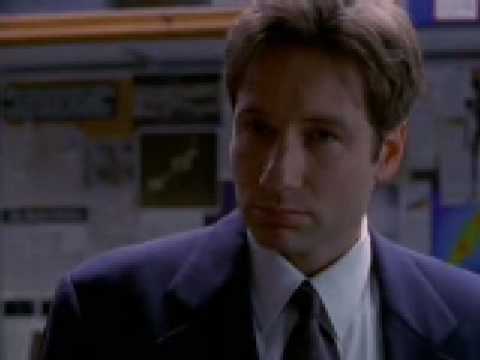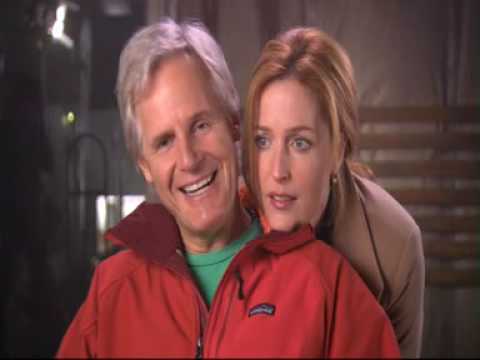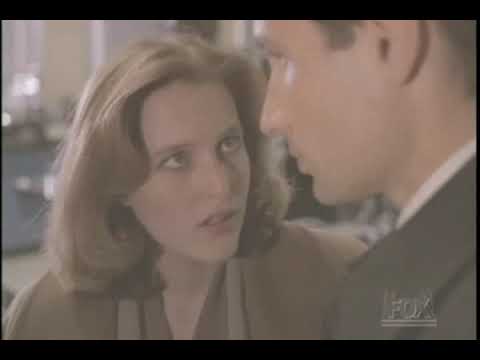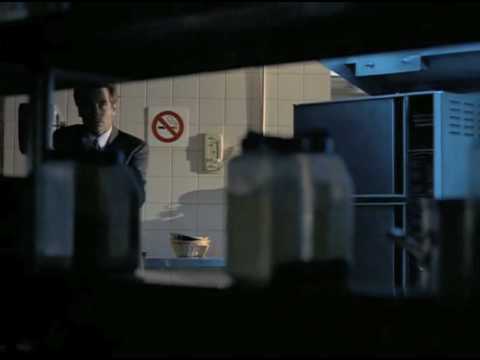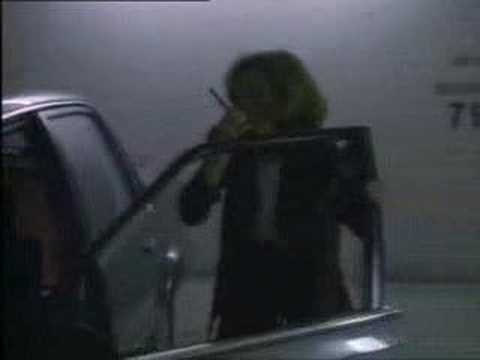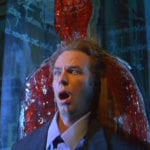I will admit it, this wasn’t an easy inclusion, and it could be my bias squeezing this one in the list over cinematic masterpieces such as “Humbug” and “Post Modern Prometheus.” Hardcore fans will recognize these masterful episodes of course, and to those of you new to The X-Files, be sure check them out. But “Our Town” makes it to no. 15, as horror was one of the fundamentals when putting together this list. This episode has the potential to scare the hell out of anyone because of the unsettling tribal masks and axes it features. There is something very secretive going on in this town, and you can guess that it’s taboo. It injects just the right amount of science and history into the storyline, and tries to give the whole account a plausible edge; something The X-Files has always tried to do in most of their episodes. It succeeds, and establishes the morbidity of The X-Files, something on which the show thrived.
“Monday” is one of those very clever episodes where the idea behind the story is fascinating enough to render you curious and impatient, thus baiting you completely into watching until the end. Mulder gets to repeat the same day numerous times to avoid a certain consequence. If you liked the film Groundhog Day, you will definitely like “Monday.” It is basically the same concept, but it is different enough to be classified as an original. The ending is very depressing, and be warned if you are privy to emotions. The beginning throws you off as you wonder how the characters are ever going to get out of the scene depicted. But it happens; they do survive, albeit with a certain sacrifice. At no. 14, “Monday” has long been a crowd-puller for me.
One major weakness or criticism of the X-Files has been its lack of diversity in the story-lines. There were easily a number of themes which the fans felt were overused throughout the series. Mutation was the all-purpose reason for almost all of the show’s monsters, and there were a multitude of episodes featuring clones. But that, of course, doesn’t mean the episodes were any less entertaining, it’s just that it makes my job a little harder since now I feel I can’t leave out the whole cloning aspect of the show. Hence at no. 13, I present you “Eve,” the show’s best ever clone themed episode. The whole child horror cliché is milked to the maximum in this case, and it has a pretty neat background story. I feel that you would be missing out on a huge sub-genre of the show if you don’t watch “Eve.”
It’s another one of those episodes which I just have to pick because of a major sub-category of The X-Files it represents: body transformation. You see this being featured in just too many episodes, and the character of Eddie Van Blundth takes the cake at this craft – he is able to take on anybody else’s shape, complete with the right voice. It is the first comic episode featured in this list, something which a science-fiction thriller show such as The X-Files was surprisingly good at churning out. But I like it because it is not flat-out comedy like some other marvelous episodes on the list; the likelihood of danger never escapes until the end of the episode. It is quite an uncommon experience to find yourself doubting whether the characters are really themselves, because it just could be Eddie in disguise. This is one treat not to be missed.
This was a brilliant episode for the unique, but thought provoking, explanation for aliens existing right here on Earth. It wasn’t creepy at all, much unlike some of the other episodes on this list, unless you have Katsaridaphobia – fear of roaches. In fact, it is a somewhat logical episode with reasonable theories hinted to account for all the bizarre occurrences with the roaches. I shan’t give anything more away, staying true to my promise of sidestepping the plot-line. It is a fresh, relatively light-paced episode, and I love how the alien theme is still kept alive, despite not going over the top with any UFO depictions or mutant other-worldly creatures. “War of the Coprophages” is a true stand-out episode of the series and well-worthy of the no. 11 spot.
This episode is packed with action right from the beginning. We get to see one of the main, if not the main premises underlying the whole series in full action, i.e. Mulder’s relentless pursuit of the truth. Mulder always distrusts, and when he has potential access to some key information, he is unwilling to compromise, even in a ridiculous situation as presented in the episode. “Drive” highlights the govt. conspiracy aspect of the show, a recurrent theme throughout the entirety of the series. Scully is seen working at the lab, it is easy to forget that she is of a medical background, and before all these new crime shows featuring that female crime forensics expert, there was Scully. She could do an autopsy as well as she could kick some ass. The episode doesn’t have a happy ending, but what precedes it is pure excitement. It draws you in, and you are left wondering how sinister some agendas can be.
“Field Trip” scores a lot of points because of its uncertainty, another aspect of the show which truly reveals its surreal nature. At any point, you can’t figure out exactly how much danger the show’s two lead characters are in. A couple is found dead in the hills, and the investigation begins. You have the quintessential clash of opinions, with Mulder rooting for supernatural explanation and Scully sticking to her rational science. This episode proves, once and for all, how easily one is liable to die in The X-Files, and the FBI duo is tested to their limits, though not in a way you would assume. Like another episode in the series “Folie a Deux,” you seem to have it all figured out, before the twist kicks in. Watch “Field Trip” to get a real idea about how precariously the agents had operated all throughout the series.
At no. 8, “Pusher” is easily a terrific episode. You have a very memorable villain in the master hypnotist Robert Patrick Modell, aka Pusher. He’s named for his suggestive powers which he uses devastatingly to escape authority throughout the episode. I fancy this piece because Pusher’s powers just seem unstoppable and the guy comes off as a total badass, in both this eponymous episode, and in a sequel in a later season; though it isn’t counted as a two-part episode, as the episodes are not successive. Near the ending, the scenes are very climactic, with tensions running high. Pusher’s powers keep you amazed and also drawn to the edge of your seat. You simply need to know if Pusher can have his way or not, as the whole episode plays out in the likelihood of producing an explosive showdown. Overall, very enjoyable and thrilling to watch.
“The Goldberg Variation” is the tale of one Chicago resident possessing unbelievable luck. Willie Garson, you might know him as Mozzie from White Collar, does an excellent job of portraying the man whose inexplicable fortuity causes less fortuitous happenings around him. It’s almost as if the universe plots a series of occurrences which always end up favoring him. Just like the machines first created by American inventor Rube Goldberg, a certain chain of events play out, the end result of which benefits the very lucky character of Henry Weems. Shia LaBeouf from Transformers makes an early career appearance as a sick kid in need of a rare blood type. Weems’ humanity shows through, as he harbors real concern for the kid. This casual episode is certainly atypical, in the sense that it doesn’t focus on Mulder and Scully as much, rather it plays with this idea of unbelievable luck. It shows how things can be so strange, which when you analyze in further depth can cause an overwhelming direful feeling. That’s The X-Files for you.
Behold the comic giants. Now there are tons of episodes in X-Files with sprinkles of comedy, but once in a while they released an episode which fell right into the comedy genre. This episode is outrageous. It is probably the lightest episode ever on X-Files. There seems to be no seriousness at all, except for maybe the haunting opening theme which accompanied every episode. There is an abduction story, and the interrogations which follow are hilarious. Little grey aliens are featured, and no X-Files list would be complete without these pear-shaped headed creatures, which have undeniably helped to seal the image of the stereotypical alien in our minds. Jose Chung is a science fiction novelist, and he interviews Scully for research on an upcoming book he plans to write. It is extraordinary how much homage is paid to science fiction through references and jokes. The episode qualifies as must-watch because you could never claim to have explored the artistic horizons of The X-Files without experiencing “Jose Chung’s From Outer Space.”
“Bad Blood” comes in at no. 5. Yes, David Duchovny is quite a brilliant actor, capable of being as serious as he can be funny. Sometimes he is both at the same time, which happens to be his signature. “Bad Blood” is the episode which, in my opinion, put the stamp of approval on the comedy potential of The X-Files. We get to see a different interpretation of the day’s happenings, from Mulder and Scully, and hilarity ensues. The best comedy in the show resulted from the fun chemistry between the two FBI agents, and this is exactly what’s on display in “Bad Blood” as the two argue over how things really transcribed that eventful day. It is a rousting display of how men’s and women’s brains work – what they choose to remember, and what they choose to forget. Some might say there were funnier episodes, such as “X-COPS” and “Hollywood A.D.” but those episodes use more external props and fail to juice out as much comedic talent from David Duchovny and Gillian Anderson. “Bad Blood” is a true great, which will always remind people how The X-Files wasn’t all about horror.
At no. 4, there is “Milagro.” It’s one of those rather rare episodes where we get to see the vulnerabilities of the main characters, Scully being exposed in this case. This isn’t however, the most spectacular incidence where we get to see Mulder or Scully emerge from their rigid veneer of FBI agent personas. There are other episodes, such as “Syzygy” which I can recommend solely for that purpose. But it’s the mix of things which the episode brings to the table which is intriguing, most notably the fear element. The episode is scary perhaps because it accepts the fact that imagination in the best source for jitters. There is the eccentric lonesome author, whose work seems to transcend mere fantasy and cause very real consequences outside the four walls of his apartment. The episode has a “Secret Window” feel to it, and when you see it, you’ll know what I mean, but it was produced 5 years before the Johnny Depp thriller so let’s give it its due recognition.
We have all seen the Satan angle resurface innumerable times, in a multitude of horror shows and movies, The X-Files included. I personally don’t find the concept of the Devil or hellish fires to be quite so frightening, but when the supposed manifestation of the devil is played so convincingly, I have to take my hat off and proclaim “Die Hand Die Verletzt” as the show’s most out and out scariest episode, ever. Translated from German, the title reads “the hand that wounds,” and substitute teacher Ms. Paddock does exactly that. She wounds cold bloodedly with black magic. There are other sickening sub-plots too, as is the case with most episodes, but it’s the pure evil which Mrs. Paddock emits which makes the episode so nightmarish. You haven’t experienced evil until you have seen “Die Hand Die Verletzt.” Those big black pupils twinkling is enough to set the adrenaline going and bag this episode the no. 3 spot.
The X-Files had a few episodes about psychic abilities, as per the supernatural theme, but this one is miles ahead of the rest of them. “Clyde Bruckman’s Final Repose” is made so memorable by the late Peter Boyle, whose performance as Clyde Bruckman was, perhaps, his best ever. He is not the antagonist in the episode. That is left to a serial killer who goes around murdering fortune tellers. But Bruckman is a true psychic, with the ability of predicting one’s death. The show has a lot of fun with the character’s ability, fully understanding the possible implications and scenarios of such powers, and Boyle pulls it all off brilliantly. This is such an amusing episode and yet is chillingly terrifying at the same time. Anybody want a lesson on eyebrow acting? See this episode. Anybody want a lesson on specialized scriptwriting entailing a particular character? See this episode. Anybody want to ruminate on just how great one episode can turn out to be? Just see this episode.
Whenever people bring up The X-Files, the character of Tooms is never far behind Mulder and Scully in people’s imaginations. His status is iconic amongst The X-Files monsters, as he was the first ever monster-of-the-week. People took a special liking to these monster-of-the-week episodes as they weren’t related to the usual UFO storyline, and therefore brought fresh fear and excitement. You talk to any X-Files aficionado, and they will declare Eugene Victor Tooms as the classiest or coolest monster ever. “Squeeze” is the name of the episode, and it’s exactly what this freak of nature is capable of doing. His body stretching is even immortalized on the X files intro. Staying true to revealing as little detail as possible, as seen throughout this list, I won’t go on any further. “Squeeze” takes the no. 1 spot for giving us Tooms, and bringing in the first real T.V ratings and thus helping The X-Files to sustain as a credible science fiction/horror show at the time. To this day, small openings such as ventilators make me feel a little uneasy. I guess you never forget your first monster. “Squeeze” set a high benchmark for all other episodes to follow, and for that we are thankful.
